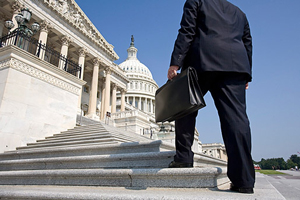
Senate Republicans, infuriated over Democrats’ refusal to allow amendments to a bill that would extend some tax cuts, voted to block the tax extenders bill yesterday.
The GOP bloc wanted to introduce an amendment that would repeal the 2.3% medical device tax enacted as part of Obamacare and another to strike a wind production tax credit. But majority leader Sen. Harry Reid (D-Nev.) closed off the minority’s ability to introduce amendments and sent the tax bill to a cloture vote that need 60 "ayes" to pass.
The tax extenders bill failed on a 53-40 vote, with only Sen. Mark Kirk (R-Ill.) crossing the aisle to vote with Democrats. Reid said if the cloture vote had gone his way, he would have allowed Sens. Ron Wyden (D-Ore.) and Orrin Hatch (R-Utah) to work out an amendments package, The Hill reported.
Hatch, a prominent advocate for repealing the device tax, said he voted against cloture because a higher principle was at stake.
"It’s more important to assert our rights than to do anything else," said Hatch. "I consider the way the Senate is being run right now to be an absolute tragedy. It’s inexcusable," Hatch said, according to the website.
"Don’t we care a little more about freedom and the right to bring up your amendments and the right to be a participant in the process?" Hatch said, according to Politico. "We’ve always had rights around here and that’s what’s involved here, that’s what the whole thing is about. It’s not about trying to stop this bill – it’s saying, ‘Look, we’ve had enough of this crap.’"
"Republicans can’t take ‘yes’ for an answer – they just voted against the second bipartisan bill in less than a week," Reid countered. "That’s what just happened: the Republicans voted against tax cuts. So maybe the Republicans will hear from their friends down on K Street and around the country and maybe they will learn this is pretty important to everybody."
The medical device repeal amendment, sponsored by Sen. Pat Toomey (R-Pa.), would have rolled back a tax that’s applied to all U.S. sales of prescribed medical devices.
"Repealing the device tax will help ensure that these businesses can continue to innovate and grow, and this amendment is part of my continued effort to stand up for our state’s medical device manufacturers, the people they employ, and the consumers whose lives they help improve," co-sponsor Sen. Kelly Ayotte (R-N.H.) said, according to the Union Leader.

